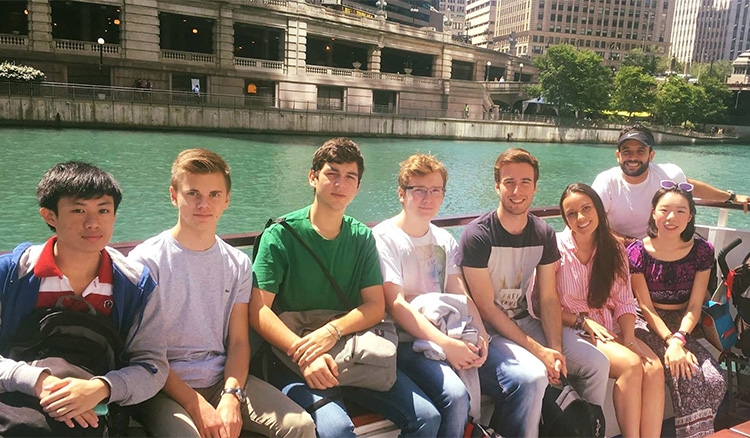 Beyond time in the classroom, DePaul's English Language Academy's Summer Language and Culture Program also includes multiple excursions in the city and surrounding suburbs, giving participants a fully immersive experience. (Image courtesy of Lars Gingery)
Beyond time in the classroom, DePaul's English Language Academy's Summer Language and Culture Program also includes multiple excursions in the city and surrounding suburbs, giving participants a fully immersive experience. (Image courtesy of Lars Gingery)
Do you have international visitors arriving this summer? Are they looking for a meaningful, fun way to enhance their English language skills while also discovering Chicago's rich cultural offerings? Since 2004, DePaul's English Language Academy's Summer Language and Culture Program has sought to connect English-language learners to Chicago's diverse neighborhoods and history.
"Many students and faculty are gone during the summer, so utilizing that time is a great way for us to continue using Chicago as an urban learning environment, especially for folks who aren't here year-round and want to make the most of their visit to the city," say Lars Gingery, associate director and registrar for the English Language Academy.
Since its inception, the Summer Language and Culture Program has grown and evolved into its current design. Participants spend 15 hours per week for four weeks speaking, listening, reading and writing in English as they explore a variety of topics related to Chicago, ranging from blues music to architecture to food. Beyond time in the classroom, the program also includes multiple excursions in the city and surrounding suburbs, giving participants a fully immersive experience.
"Though it is a language program, it's structured well for tourists," says Sabah Khan, the English Language Academy instructor primarily responsible for the program in its current form. "There are no 8 a.m. calls, and most afternoons are free. Although there is some homework, we try to connect it to the excursions. We also offer an immense amount of support and try to tailor activities to the participants' English skills."
To participate in the program, students must be 16 or older and have at least an intermediate-level understanding of the English language. Though most participants are high school juniors and seniors traveling before they begin college, Gingery and other program coordinators have seen all ages engage over the years.
"We've had relatives of DePaul employees in the program before and participants of all ages," Khan says. "It really becomes a melting pot of ages and cultures; everyone brings different experiences to the table, which only further enriches our time together. The best part is that many of our students stay in contact with us and each other after the program ends; some show interest in DePaul for their university studies."
Though language learning is the main objective of the program, coordinators aim to provide students with more than just English skills.
"Our hope is to connect people and cultures, and help them discover the corners of Chicago they may never have found on their own," Gingery says.